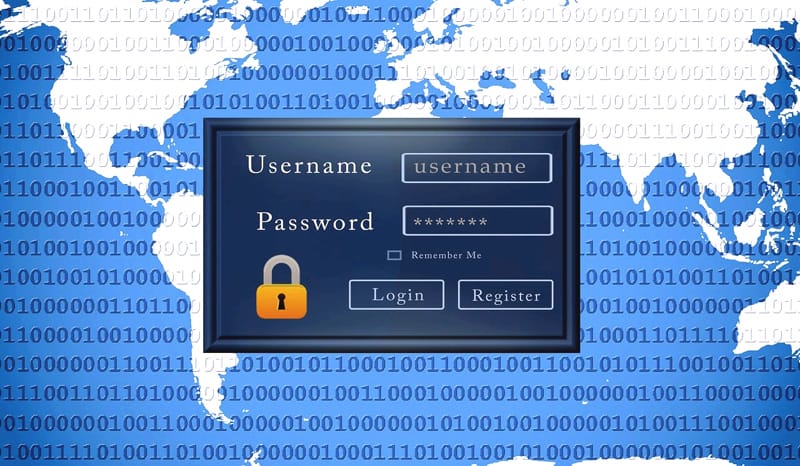Your personal data is a valuable asset in today’s modern digital age that is very much data-driven. So, just like how you would protect your smartphone from robbers, thus you should also protect your data security.
Your data security is important because cybercriminals and big corporations are constantly seeking ways to exploit how to harness your data online. They are always there lurking around in the digital realm looking for loopholes, weak defenses or other ingenious ways to gather more data about you.
I hope you are aware that a lot of what you do online is monitored by Internet trackers. Fortunately, there is good news, and that is protecting your online privacy doesn’t require expert skills.
Here are ten simple steps how you can begin safeguarding your data security.
1. Using Strong And Complex Passwords
Weak passwords are an open invitation to hackers, thus it is particularly crucial to create strong and complex passwords for your sensitive accounts.
Sensitive accounts can be your e-banking accounts, digital wallets or any other online accounts that hold your financial or important work information. Digital wallet security is a hot topic these days because they are increasingly becoming a favorite target for hackers and scammers.
Social media business accounts are known to be favorite targets for hackers. So, please do not neglect to protect them too with strong passwords.
Even an amateur hacker knows how to utilize brute force methods to guess simple passwords within minutes. Therefore, start doing these essential steps with regards to your passwords:
- Use long, complex and unique passwords for each of your online account. Using the same password for multiple accounts is akin to using one master key that can open different doors into your home. To create strong passwords, you can consider utilizing a free password generator tool.
- Avoid using words found in the dictionary or personal information in your passwords. E.g. do not use your birthday date, identity card numbers, addresses, nicknames, personal names, etc. Hackers can make use of these information to attempt access into your online accounts.
2. Two-Factor Authentication (2FA) Is Essential For Data Security
2FA has proven to be a fairly effective defense against preventing unauthorized access into your online accounts. However, we still hear of breaches into high-profile accounts secured with 2FA. So, you cannot expect it to be totally foolproof.
Nevertheless, you should still opt to activate 2FA whenever it is available. Sensitive accounts like emails, online shopping, e-banking and social media accounts are known to be favorite targets for hackers.
In addition, it has been said that using an authenticator app is more secure than SMS based 2FA. I’m not sure how valid this statement is, so you should do your own research.
3. Install A Virtual Private Network (VPN) For Better Data Security
It is best to avoid using public Wi-Fi but if you must, make sure your VPN is connected. Hackers can easily harness unsecured personal data off your mobile device if they are also on that Wi-Fi network.
There are a few popular VPNs in the market and their prices vary quite a bit. So, you should spend some time to do your own research and the pick the one that suits your needs. It is not recommended to use free VPNs as it might be loaded with malware.
For myself, I am using FastVPN by Namecheap. It is cheaper than some of the other VPNs and I find it sufficient for my needs. It is also easy to install and has a strict zero logs policy.
Tech Tip: Pay heed to your data privacy.
A lot of what you do online is tracked! There is no way to completely block or avoid all Internet trackers, but you can at least use a Virtual Private Network (VPN). Use my affiliate link below to get an offer and I may get a commission if you make an online purchase at Namecheap’s website.
Work from home with a secured connection with Namecheap FastVPN.
4. Keep Your Operating System and Apps Updated
Those frequent updates that you encountered in your digital devices are not nuisances. Very often, the updates are bundled with features to improve the security of the device.
Whenever possible, you should enable automatic updates for your browsers, devices and apps. The updates will consume up the memory on your devices, so make it a habit to delete unused apps periodically. Doing so helps to free up memory and improve the security of your device too.
You should always scrutinize apps that ask for additional permissions without a legit reason. Data protection laws vary a lot between countries and app developers may take advantage of lax laws to capture more than necessary data about their users.
5. Improve Your Data Security By Limiting Social Sharing
Love or hate it, social media platforms have become integral digital tools in our lives. Even if you don’t regularly post about your life, you should still be vigilant about what you comment or liked.
Our digital interactions may seem harmless but there are actually complex algorithms analyzing your online actions. Everytime you click, liked or post something, data about your behavior is gathered. The data is then used to form a comprehensive profile of your interests, behavior and demographics.
Furthermore, although it might seems like harmless fun to share personal details about your life, but you must bear in mind that you are sharing with strangers too. Anyone can take a screenshot of your posts and you never know who might use your personal details for malicious intents.

Content Creators Always Upskill Themselves
With Alison’s free education, you can easily enrol in content creation online courses complete with graded assessments. You only pay if you need the certificate and I may get a commission as an affiliate.

Data Security Tasks You Can Do Now
6. Use Browsers and Search Engines That Focus on Data Security
You should begin to use web browsers that are known to be more focused on protecting user privacy. This type of browser usually comes with built-in ad and trackers blockers and they are activated by default. Some examples of privacy-friendly web browsers are Brave, DuckDuckGo and Vivaldi.
For better data security, you should also ensure your web browser is blocking third party cookies. Such tracking cookies normally originate from advertisements and they track your movements across websites.
As for search engines, you should reconsider using Google extensively as it is known to gather a huge amount of data about its users. Some alternatives that are known to be more privacy friendly are DuckDuckGo or Startpage.
Please bear in mind that private or incognito mode in your web browser does not block Internet trackers. It simply means your browsing session will not save any cookies and history in your computer. The feature is normally only useful if you are using a shared computer.
7. Beware Of Phishing Scams. Check Before You Click On Links
You should make it a point to train yourself to always check the domain name or URL of the links before you click on them. When you hover over a link with your mouse, the address of the website usually appear on the lower left corner so you can tell if the link is legit.
Cybercriminals love to catch users off-guard and direct them to fraudulent websites so they can steal your login details. Thus, you should always verify anyone who sends you a message with a link to click on or a QR code to scan.
A cybercriminal could very well be impersonating your friend, boss or colleague to mislead you into visiting a malicious website. Then they might trick you into downloading a type of malware known as a keylogger. This type of malware silently records everything you type on your keyboard, which includes your username and passwords.
8. Encryption Is A Key Component Of Data Security
I hope you are aware of the importance of ensuring the websites you visit are secured with a SSL certificate. The certificate basically ensures that your data transmitted from the website is encrypted, so it is not human readable.
If the website is not encrypted, any data that you submit through the website can be plainly read by anyone who is monitoring the transmission. It also means the unauthorized watchman may alter your data whilst it is being transmitted to the recipient.
As a layman, you do not need to understand the inner workings of encryption. In fact, modern web browsers will normally prompt you with a warning if you are about to visit an insecure website. Nonetheless, you should still always check that the address of the websites you visit are preceded with a https:// or a locked padlock icon. In addition, you should also make sure your messaging apps are encrypted e.g. WhatsApp, Signal or Telegram.
Apart from making sure your data and messages are encrypted, you might also want to consider encrypting files that contain highly sensitive data. There are various ways to encrypt files with third-party and built-in tools found within operating systems. The tools are normally quite user-friendly, so it is not likely that you will need extensive technical skills.
9. Make It A Habit To Regularly Backup Your Data
It is recommended to regularly run a system cleanup of your devices. The automatic processes will delete cache, cookies and unnecessary files that had build up over time.
You should also considering doing a full reset of your operating system even if your computer has been working fine for years. Doing a full reset should remove any silent malware or adware that is stealing your data unknowingly. Before you go through with the reset process, make sure you have a backup of all your important files. This could be your work documents, images, videos and contacts.
As a vigilant Internet user, you should make it a habit to maintain an updated backup of your important files. You never know when your computer’s file might get corrupted which may force you to do a full reset of the system.
10. Be Skeptical Of Fantastic Apps and Free Web Services
I’d like to say a note here about storing files in cloud servers e.g. One Drive, Google Drive or Dropbox. Personally, I rarely use them I’d be compromising on my data security. Despite the cloud providers’ extensive policies, you are storing files in computers that do not belong to you.
You should also be wary about downloading any free apps that promise a fantastic benefit for little or no payment. Such fantastical offers are usually either misleading advertisements or outright scams that may infect your computer with a malware.
Even if the free service or app is legit, you should consider making a payment if you want to continue using it. This is because there are always business costs associated with offering a free service to you and these costs must be recouped. This is the reason why you’d normally find advertisements in free apps. Unlike newspaper advertisements, digital advertisements are not just hoping to get you to buy something. They also store tracking cookies in your computer devices without notifying you. Whatever data they collected about you from the advertisements might very well be sold to marketers.
Last but definitely not least, popular free emails like Gmail are actually not private at all. If you are concerned about your data being read by Google, you should change to a secure email provider like ProtonMail or Tutanota. These platforms are known to prioritize privacy, ensuring that your emails and sensitive information remain confidential.
Be More Tech-Savvy With Free Computing Online Courses.
You can study free IT and computing online courses with Alison and complete the entire course with graded assessments. You only pay if you need the certificate and I may get a commission as an affiliate.
Conclusion
It is practically impossible to list out the vast extensiveness of data that are collected from Internet users. The steps outlined in this brief post is not at all thorough by any means to totally secure your data..
There is hope that decentralized Web3 will give some control back to the users on how their data is. There is even talk about Web3 Internet users being able to monetize their personal data rather than allow the corporations to monetize off its users. Alas, after more than a decade, Web3 is still very much in its infancy and the majority of Internet users still have to rely on the many services offered by the big corporations.
From here on, you can proceed to gain more understanding about protecting your data privacy from Namecheap’s blog. Remember to stay vigilant online!







